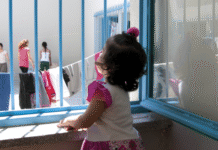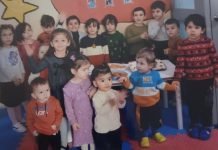Rights activist Gamze Yentür said in an interview that Turkish prisons do not accommodate the needs of children and infants who accompany their incarcerated mothers, leading to problems in their physical and mental development.
Speaking to the Duvar news website, Yentür said children had to accompany their mothers in prison either because they were very young or because there was nobody to take care of them on the outside. She said ages zero to six were critical in a child’s development and that they needed various stimulants for proper mental development.
However, children of political prisoners in particular are not even provided crayons. In Elazığ Prison, children are not allowed to use red and green crayons because they are colors in the Kurdish flag. “For children these colors do not signify anything political. They are the colors of nature,” Yentür said.
Prohibitions in Turkey against use of the Kurdish language, clothing, folklore and names go back to 1937.
Yentür added that some mothers said their cells were not even provided a carpet for crawling babies and that they made makeshift rugs out of blankets. Many children did not have their own beds and shared their mothers’ food.
“Nutrition is incredibly important for children’s physical development, and although prison regulations explicitly state that pregnant and breastfeeding mothers as well as children should be provided with nutritious food, this is really not the case in practice,” Yentür said.
She explained that only a liter of milk a week was provided per mother and child, which was not enough.
Many children also developed asocial behaviors from not having enough social contact. They also do not have toys or a daycare center where they can learn to socialize with other children.
According to Yentür some children did not have access to proper healthcare in prison and women who had just given birth were not provided with follow-up care.
Yentür said such practices contradicted the Law on the Execution of Sentences and Security Measures, which stipulates that even if a pregnant woman is convicted, her sentence must be postponed. According to the law, “execution of the prison sentence is delayed for women who are pregnant or have given birth within the last year and a half.”
Yentür said as of December 2021 there were 548 children in prison with their mothers.
Human rights advocates have said the courts need to take into account the economic and family situations of mothers with children under 6 and that female inmates with children should be in prisons with better conditions where children can be raised well.















